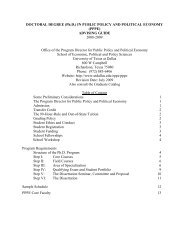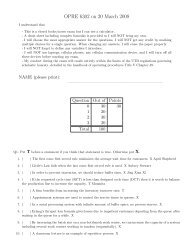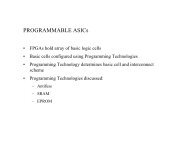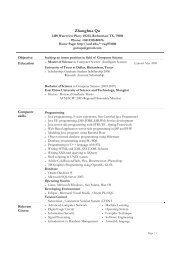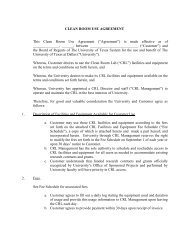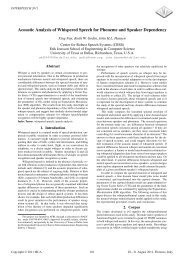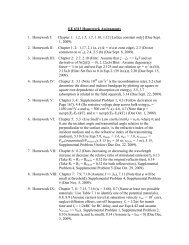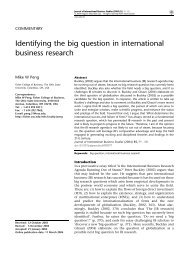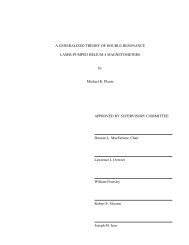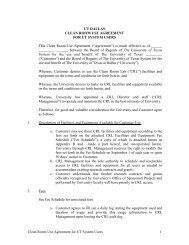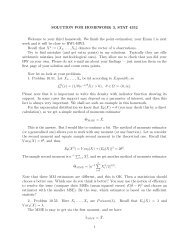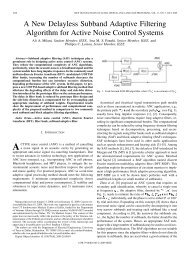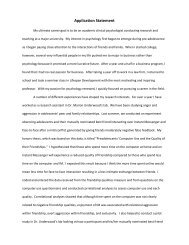Behind Intermediary Performance in Export Trade - The University of ...
Behind Intermediary Performance in Export Trade - The University of ...
Behind Intermediary Performance in Export Trade - The University of ...
Create successful ePaper yourself
Turn your PDF publications into a flip-book with our unique Google optimized e-Paper software.
ity has a significant impact on per capita<br />
sales (but not on marg<strong>in</strong> or overall performance),<br />
because negotiation is primarily<br />
focused on mak<strong>in</strong>g the sale rather<br />
than the overall bottom l<strong>in</strong>e.<br />
While each <strong>of</strong> the four capabilities was<br />
found to be significant (at least once),<br />
their impact was not equal. <strong>The</strong> contributions<br />
<strong>of</strong> export knowledge and tak<strong>in</strong>g<br />
title outshadowed the impact <strong>of</strong> product<br />
specialization and negotiation ability.<br />
Specifically, the benefit <strong>of</strong> <strong>in</strong>creas<strong>in</strong>g one<br />
standard deviation above the mean <strong>in</strong><br />
export knowledge and tak<strong>in</strong>g title would<br />
provide approximately the same level <strong>of</strong><br />
performance <strong>in</strong>crease to the export <strong>in</strong>termediary.<br />
Both means were approximately<br />
3 with a standard deviation <strong>of</strong><br />
less than 1, and both coefficient estimates<br />
were approximately 0.3 <strong>in</strong> Model<br />
1, 0.2 <strong>in</strong> Model 2, and 0.6 <strong>in</strong> Model 3.<br />
In comparison, the impact <strong>of</strong> improv<strong>in</strong>g<br />
product specialization by one standard<br />
deviation above the mean would be only<br />
half as much, as evidenced by a coefficient<br />
estimate <strong>of</strong> approximately 0.4 with<br />
a mean <strong>of</strong> 0.5 and a standard deviation <strong>of</strong><br />
0.5. F<strong>in</strong>ally, the impact <strong>of</strong> negotiation<br />
ability, with a mean <strong>of</strong> 3 and a standard<br />
deviation <strong>of</strong> 0.75, was unstable. <strong>The</strong>se<br />
f<strong>in</strong>d<strong>in</strong>gs have important implications for<br />
<strong>in</strong>termediaries which need to channel<br />
their limited resources <strong>in</strong>to certa<strong>in</strong> areas<br />
for capability development.<br />
DISCUSSION<br />
Contributions<br />
This study makes three contributions.<br />
First, it theoretically <strong>in</strong>tegrates three<br />
complementary perspectives. Although<br />
transaction cost and agency theories<br />
have clearly specified the relationship<br />
between manufacturers and agents, they<br />
have been criticized for be<strong>in</strong>g too narrow,<br />
focus<strong>in</strong>g only on the pr<strong>in</strong>cipals’<br />
MIKE W. PENG, ANNE S. YORK<br />
standpo<strong>in</strong>t. On the other hand, the resource-based<br />
view has been criticized as<br />
be<strong>in</strong>g too broad. Often resources cannot<br />
be clearly described, let alone accurately<br />
measured. Here <strong>in</strong> the context <strong>of</strong> <strong>in</strong>termediary<br />
performance <strong>in</strong> export trade, we<br />
have identified a context <strong>in</strong> which these<br />
three theories comb<strong>in</strong>e to suggest an empirically<br />
falsifiable model (Peng, 1998).<br />
Specifically, transaction cost and agency<br />
theories may “<strong>in</strong>form the generic decision<br />
[<strong>of</strong> governance choices] . . . while<br />
[resource-based] competence br<strong>in</strong>gs <strong>in</strong><br />
particulars” (Williamson, 1999, p. 1097,<br />
orig<strong>in</strong>al emphasis). What we have done<br />
<strong>in</strong> this study is to use transaction cost<br />
and agency theories as the bedrock <strong>of</strong> the<br />
empirical context, while allow<strong>in</strong>g for resource-based<br />
hypotheses to emerge.<br />
<strong>The</strong>refore, one can argue that the resource-based<br />
view provides an important<br />
solution to a transaction cost and<br />
agency theory problem (Peng and Wang,<br />
2001).<br />
Second, this study contributes to the<br />
empirical literature focus<strong>in</strong>g on these<br />
three theories, which are regarded as<br />
three <strong>of</strong> the most difficult-to-operationalize<br />
theories <strong>in</strong> strategy research (Godfrey<br />
and Hill, 1995). It supports the resource-based<br />
view <strong>in</strong> that the firm can be<br />
conceptualized as an embodiment <strong>of</strong><br />
knowledge. As a hard-to-imitate asset,<br />
such knowledge cannot be quickly replicated<br />
or acquired, thus giv<strong>in</strong>g <strong>in</strong>termediaries<br />
which possess it an opportunity<br />
to “rent” it out (Chi, 1994). Overall, we<br />
have demonstrated that the relative performance<br />
<strong>of</strong> <strong>in</strong>termediaries <strong>in</strong> the presence<br />
<strong>of</strong> positive transaction and agency<br />
costs is a function <strong>of</strong> their hazard mitigat<strong>in</strong>g<br />
capabilities (Peng and Wang,<br />
2001). 14<br />
F<strong>in</strong>ally, this study also contributes to<br />
the extant literature on channel choice<br />
and export strategy. While most exist<strong>in</strong>g<br />
VOL. 32, NO. 2,SECOND QUARTER, 2001 339



